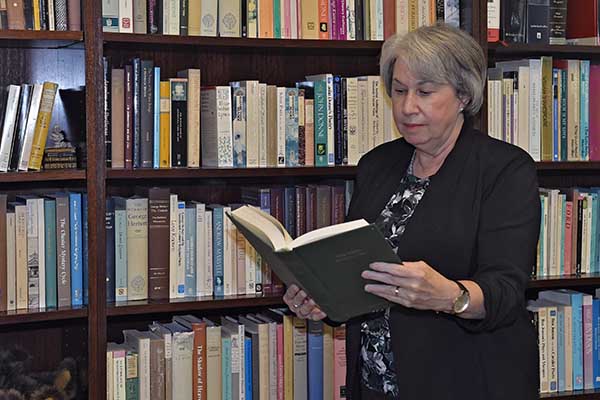
Nancy Gutierrez, dean of the College of Liberal Arts & Sciences (CLAS), is a seasoned academic leader, and like her predecessors and fellow deans, she is helping to sustain the University’s tradition of strong leadership.
She shares her insights about leadership, the University’s impact on society and equipping students to lead.
UNC Charlotte has a rich history of strong leaders. What defines a strong leader?
This is the wrong question. The right question is how this environment is an incubator for leadership. Because of its commitment to access, UNC Charlotte welcomes students from a breadth of our social, economic and cultural strata. It embraces difference and heterogeneity, thus building an environment where quirkiness is accepted and risk-taking is celebrated.
Here is one example: UNC Charlotte created one of the first Black Studies programs in the late 1960s, and these pioneers went on to establish the Afro-American Cultural Center (1974), now the Harvey B. Gantt Center for African-American Arts + Culture, and to found the National Council for Black Studies (1975). Ben Chavez, a student who majored in chemistry, began his career as a civil rights leader, working with these pioneers.
“Leadership” is a word that should be coupled with “opportunity.” The environment created, simply by virtue of the diverse and eclectic community on campus, offered all of us the space to grow individually and to build the institution. This “opportunity” attracted individuals who were primed to grow as leaders.
Students and faculty come here to grow as human beings and, by so doing, grow the institution.
How have society’s issues and the University’s influence on them changed over the time of your leadership? How can faculty and other leaders apply their expertise to deepen University and college impact?
The most significant change in society during the 15 years I have led the College of Liberal Arts & Sciences is the deep distrust of our national institutions and the related distrust of expertise. This is dangerous, because it is expertise and inquiry that is the key to addressing the huge problems in America and the world — the COVID-19 pandemic, systemic racism, social inequity — but also infrastructure needs, health care, education reform, environmental concerns and other issues with direct impact on people’s lives.
The primary mission of CLAS is inquiry — helping undergraduates develop a curiosity about the world and a lifelong interest in learning more about it; working with graduate students in a particular area of knowledge or discipline so they can make a deep dive into a career and live a life with purpose; and facilitating faculty research for what it discovers about the world around us. Inquiry is a pathway leading to both individual and community wellbeing.
In other words, the college is a community of individuals — faculty and students both — who embrace the power of their intellect. Thinking matters.
This public distrust of expertise has led to significant public skepticism about the worth of a college degree, and more specifically, the worth of a degree in liberal arts and sciences. CLAS faculty counter this skepticism through the very work they do. And our students are our best ambassadors, as they leave CLAS as lifelong learners, whose lives make a difference in the community, whatever their areas of concentration.
Giving people a broader knowledge and understanding of the world in which they live is an essential role for the college. Liberal arts and sciences education is needed now more than ever in a society that is forgetting or questioning history and the importance of learning.
What are the top goals for the College of Liberal Arts & Sciences for the near future?
Our broad goal is to advance equitable policies, processes and practices to ensure that our students, faculty and staff succeed. This goal goes far beyond diversity and inclusion, although certainly that is part of it. It speaks to the core imperative of justice and equity, areas that are parts of our work lives, as well as areas we study and teach.
For undergraduate students, we are focused on redefining what liberal learning means to prepare them to be tomorrow's leaders and citizens -- with a deep understanding of what justice and equity mean, so they can lead with that mindset. Our redefining of liberal learning holds particular significance in health, the environment, and humanistic arenas. This includes course work, as well as experiential learning. Data indicates that low-income students, who engage in liberal arts and sciences experiences, can improve their economic status. Our redefinition of the liberal arts and sciences thus directly impacts our focus on social justice.
For graduate students, additionally, we are centering our efforts to prepare them for their careers through intensive research opportunities that are often interdisciplinary in nature. As we chart a pathway for Research 1 status, we anticipate adding new graduate programs across the breadth of the college: for example, a Ph.D. in Digital Cultures and Communication; professional master’s degrees in crime analytics; a master’s degree in Africana Studies.
Finally, a signature characteristic of CLAS is its interdisciplinary character. On both the undergraduate level and graduate level, we continue to develop new programs that are often interdisciplinary. Several new minors are beginning to take off and we want to nurture them: for example, Capitalism Studies; Medical Humanities; Biotechnology; and Writing, Rhetoric and Digital Studies. We are also revising environmental studies, one of our fastest growing majors. And the Ph.D. in Digital Cultures and Communication is a cutting-edge collaboration among the disciplines of English; Communication Studies; Writing, Rhetoric, and Digital Studies; Computing and Informatics; and Data Science.